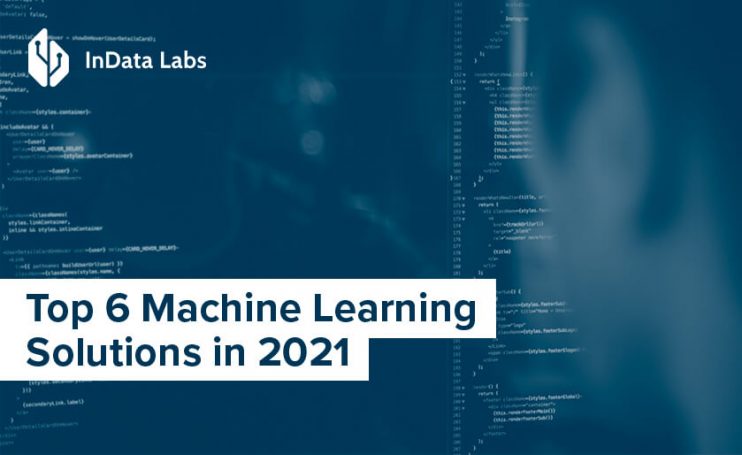Machine learning isn’t news anymore. Top machine learning solutions that support your business goals are a prerequisite in 2021 and beyond.
On one hand, you have platforms that are working towards low-code or no-code AI solutions where one needs almost no coding skills. On the other, you’ve got platforms that are more technical, but that focus on making tasks like data preparation and data management as easy as possible.
With so many offers on the market, how do you choose the best ones? The answer isn’t always a straightforward one. A lot depends on your business goals, budget, desired scalability, etc. There isn’t a one size fits all solution.
We’ve put together a list of AI and machine learning solutions that are highly competitive and have proved to deliver value to many businesses before you.
The Foundations of Machine Learning Solutions
Understanding machine learning solutions and how they work is important prior to diving into the selection process. This will provide you with the ability to critically assess the features of any machine learning solution, and decide its usefulness for your business.
There are a lot of solutions out there with groundbreaking capabilities but they will only slow your team down if they bring no real value to your data science project.
Here are just some areas where you can use the benefits of a machine learning solution:
- Predict search patterns of your potential customer
- Filter unwanted messages and content
- Curate news and content feeds
- Detect security breaches and fraud attempts

Source: Unsplash
So, why do so many companies use machine learning solutions? Because they can significantly automate and speed up processing big data. Most of the solutions today are easily compatible with each other, thus acting as building blocks for your data science team to create a solution custom for your business.
Most machine learning solutions will include:
- Data collection and data preparation
- Feature extraction
- Model training and model deployment
- Data storage on the cloud for easier access
- Drag and drop for low code alternative
- Libraries and communities that offer pre-built models and ready-to-use functions.
#1 KNIME Analytics Platform
KNIME has the big benefit of being a free and open-source solution. It is often used for reporting, data analysis, and integration because it offers a drag-and-drop interface and a visual workflow.
The whole platform doesn’t require extensive coding experience and can make creating custom machine learning solutions possible for business executives and data scientists alike. It offers ready-to-use statistical and mathematical functions, high-level predictive analytics algorithms, as well as machine learning algorithms that are all designed with task streamlining in mind.

Source: Unsplash
KNIME does utilize the Eclipse platform through plugins and connectors. Through that, you can get access to, among other features, text and image mining, which can be useful for business challenges related to a wide range of industries – ranging from healthcare to social media.
Other noteworthy features:
- Over 2,000 nodes available through the Eclipse platform. Supports various databases, connectors, and data types.
- Integrates well with other open-source solutions, such as H2O and Kera, that facilitate deep learning.
- Enables multiple codes to be run (Java, Python, and Java are the biggest ones)
- Highly scalable solution thanks to good data handling
- Well-defined APIs.
#2 Keras
Keras is another popular platform among data scientists developing machine learning and AI solutions. The platform is a brilliant choice if you are looking for a complete end-to-end solution for creating your machine learning model. It can handle both model design, model training, model evaluation, and model prediction.
Similar to KNIME, Keras has a user-friendly API that is useful for building neural network ML solutions. It’s also good for implementing deep learning and natural language algorithms. It only takes a few lines of code, which is easy to read and understand even for a non-technical person.
Noteworthy features:
- Detailed documentation that explains each function. A sizeable community of users that contribute with code and development.
- An extensive library of pre-trained models that facilitates fast deployment.
- Supports multiple GPU usage to train and deploy machine learning models.
#3 Amazon SageMaker
This machine learning solution has been on many lists for many years and not without a reason. Amazon SageMaker is utilized by some of the top machine learning companies in the world to create, train, and deploy machine learning models.
Like all other solutions on this list, SageMaker is cloud-based; it exists on AWS public cloud. It can also be deployed on edge devices and embedded systems.
One of the many benefits of SageMaker is how simple it is to use. The platform offers built-in and basic machine learning algorithms, as well as other tools intended for easy model deployment. It makes it possible for teams with little to no prior experience and skill to kick start a machine learning project.

Source: Unsplash
Other noteworthy features:
- Compatible with Jupyter notebook, including pre-constructed notebooks.
- Helps build highly accurate training datasets
- Cost-efficient. You pay only for the resources you use.
- Easy setup.
#4 SAS
SAS Institute offers a complete suite of advanced data science and analytics solutions. The platform is great if accessing your data and projects in any form and from any source is a priority.
The platform also caters to both data scientists and business leaders alike. For the latter, SAS can generate insights, which entails summary reports about the project and the models to share with non-technical stakeholders. This is possible due to embedded natural language generation. This makes project management of machine learning applications much easier.
Noteworthy features:
- Deep learning capabilities.
- Easy to connect to public APIs. Users can take advantage of high-level APIs.
- Computer vision & biomedical imaging. Users can both get and analyze images with model deployment on server, edge, or mobile.
#5 Dataiku
Dataiku allows data analysts and machine learning (ML) engineers to work together to build their own data tools. Their interface is team-focused, and it unifies development and deployment in one place.

Source: Unsplash
Much like a few other solutions on this list, Dataiku doesn’t require that much code to be written for your model. The code that defines the architecture is usually sufficient. The rest, data processing, data loading, and model training, are all handled by Dataiku DSS. The platform also creates evaluation charts for the model.
Noteworthy features:
- User-friendly interface with shortcuts that makes workflow more efficient.
- Big user community and dedicated wiki with helpful content.
- Data quality control in real time.
#6 Rapidminer
Rapidminer is a solution that focuses on predictive analytics solutions for businesses. You can access and work with almost any type of data, which is very convenient given how many data types an average business has on hand.
The solution also helps with data cleaning before allowing for detailed data exploration through data exploration and visualization tools. The interface is robust and graphical, which provides a powerful user experience. RapidMiner is written in the Java programming language.
Noteworthy features:
- Great search tools to look through repositories.
- Seamlessly integrations with third-party libraries.
Final Note
It’s important to take your time understanding the reasons why you need a machine learning solution. As you see from the list, some solutions offer similar features, while others have unique use cases. You need to focus on your desired outcome in order to understand what features are actually useful.
Make sure to know the budget you are working on. More often than now, that will be the primary driver of your choice. You might have to compromise on features and capabilities, so know what is negotiable and what is not.
Lastly, don’t disregard the fact that one solution might not be the answer for your business. You might have to integrate several machine learning solutions in order to achieve the desired goals.
Need a Machine Learning Solution to Level Up Your Business?
Contact us to arrange a consultation on your project with our data science experts.



